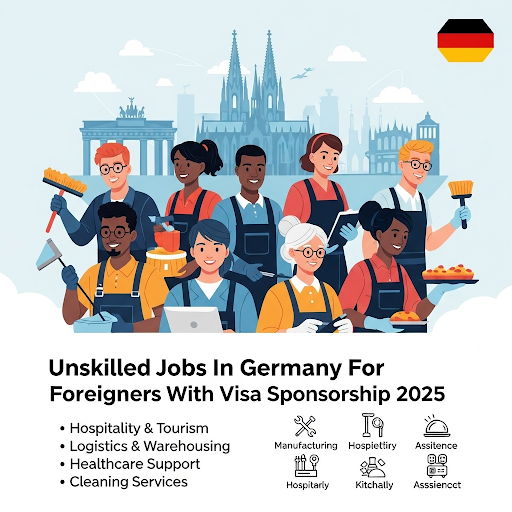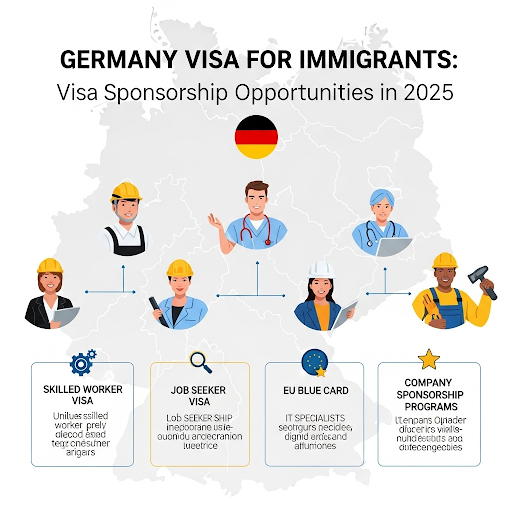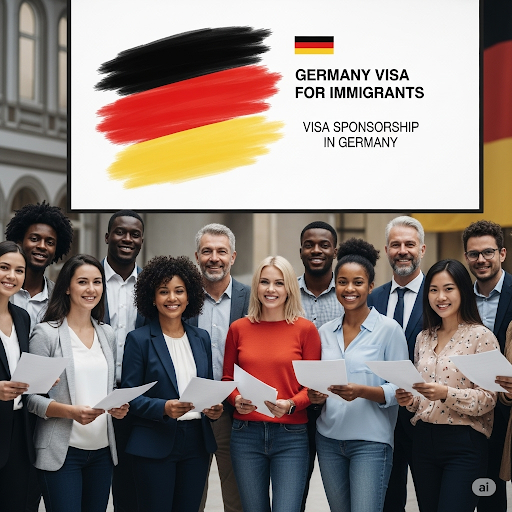Germany, Europe’s economic powerhouse with a $4.5 trillion GDP, faces a labor shortage of over 639,000 vacancies, as reported by the Federal Employment Agency (BA) in February 2025.
While skilled professions dominate immigration discussions, unskilled jobs in sectors like hospitality, logistics, agriculture, and cleaning are increasingly critical, employing 2.5 million workers.
These roles, requiring minimal qualifications, offer foreigners from countries like Nigeria, India, Kenya, and the Philippines a chance to earn €16,000-€30,000 annually in a high-quality-of-life environment.
This guide explores unskilled jobs in Germany with visa sponsorship for 2025, detailing the job market, visa options, eligibility, application strategies, benefits, challenges, and practical tips.
Drawing on data from the BA, German Immigration Authorities, and industry sources, it equips job seekers with tools to secure roles and thrive in Germany’s multicultural workforce.
Unskilled roles, such as warehouse workers, cleaners, and kitchen helpers, are accessible through employers like DHL, Amazon, and Lidl, which often sponsor visas for non-EU workers.
With a minimum wage of €12.30/hour and over 800,000 visa-sponsored openings listed on EURES, Germany welcomes international talent despite restrictive policies favoring skilled labor.
Whether packing goods in Munich or serving in Berlin’s vibrant hospitality scene, this article provides a roadmap to navigate the job market, obtain sponsorship, and build a future in Germany’s thriving economy.
The Unskilled Job Market in Germany 2025
Overview and Trends
Germany’s labor market, with 45 million workers, faces shortages driven by an aging population (20% over 65), low unemployment (3.2%), and industrial demand. Key trends include:
- Labor Shortages: 30% of vacancies (192,000) are unskilled, per BA 2024 data.
- Sector Growth: Logistics (€200 billion), hospitality (€25 billion), and agriculture (€30 billion) lead demand.
- Immigration Needs: 200,000 immigrants needed annually through 2030 to sustain growth.
- Government Initiatives: €5 billion in 2024-2026 funds integration funding, including the Opportunity Card (Chancenkarte).
- Multilingual Demand: Basic German (A1-B1) is preferred, but English suffices in urban hubs like Berlin.
High-Demand Roles and Locations
Unskilled jobs (no formal qualifications, below vocational level) include:
- Cleaner (NOC 9512): Sanitize hotels, offices, schools; €10-€15/hour.
- Warehouse Worker (NOC 9617): Pack, pick, load goods; €10-€14/hour.
- Kitchen Helper (NOC 6711): Assist in food prep, dishwashing; €9-€12/hour.
- Retail Sales Associate (NOC 6421): Assist customers, restock; €9-€12/hour.
- Agricultural Laborer (Seasonal): Harvest fruits, vegetables; €9-€11/hour.
- Construction Laborer Helper (NOC 9619): Support site tasks; €10-€15/hour.
- Delivery Driver: Transport goods with a valid license; €11-€14/hour.
Top regions for visa-sponsored jobs:
- Bavaria: 150,000 vacancies, Munich and Nuremberg lead.
- North Rhine-Westphalia: 100,000 jobs, centered in Cologne and Düsseldorf.
- Berlin: 80,000 jobs, with hospitality and logistics hubs.
- Baden-Württemberg: 60,000 jobs, focused in Stuttgart.
- High-Wage Areas: Munich (€11-€21/hour), Berlin (€10-€15/hour).
Wages and Employers
- Median Wage: €12/hour (€24,960/year, 40 hours/week), with minimum €12.30/hour as of 2025.
- Entry-Level: €16,000-€25,000/year; overtime adds €1,000-€3,000.
- Benefits: Health insurance (€100-€200/month), 20-30 paid vacation days, and training.
- Major Employers:
- Logistics: DHL, Amazon, DB Schenker, hiring warehouse workers and drivers.
- Retail: Aldi, Lidl, Metro AG, for store and warehouse roles.
- Hospitality: Accor Hotels, McDonald’s, for cleaners and kitchen staff.
- Agriculture: Seasonal farms in Brandenburg and Bavaria.
- Recruitment Agencies: Adecco, Manpower, Randstad Germany, placing visa-sponsored workers.
- Job Boards: Indeed (500+ visa-sponsored unskilled jobs), StepStone (300 jobs), EURES (800+ jobs), with hiring peaks in spring (March-May) for seasonal roles.
Basic German (A1) or English is often sufficient in urban areas, though rural jobs require German. The next section details visa options.
Visa Options for Unskilled Jobs
Non-EU nationals require work visas for unskilled roles, which are harder to obtain than skilled permits due to EU labor market tests. Below are options based on German Immigration Authorities.
Temporary Work Visa
- Purpose: For specific unskilled job contracts (e.g., cleaners, farm laborers) when no EU candidates are available.
- Eligibility: Job offer with Federal Employment Agency (BA) approval, minimum wage (€12.30/hour), and employer sponsorship.
- Duration: 6-12 months, non-extendable for unskilled roles.
- Process:
- Employer secures BA approval (4-8 weeks).
- Apply at German embassy/consulate (€75 fee).
- Submit job contract, financial proof (€1,091/month), and health insurance.
- Provide biometrics and attend an interview.
- Processing Time: 6-12 weeks.
- Benefits: Legal work status, employer support for housing/travel.
- Limitations: Tied to employer; no permanent residency path.
Opportunity Card (Chancenkarte)
- Purpose: Introduced in June 2024, allows job search for up to 1 year, including unskilled roles.
- Eligibility: Non-EU nationals with financial solvency (€1,091/month, e.g., blocked account) and basic qualifications (high school diploma).
- Duration: 1 year, with part-time work (20 hours/week) permitted.
- Process: Apply online or at embassy (€75 fee), submitting financial proof, passport, and diploma.
- Benefits: Flexibility to find unskilled jobs; urban employers (e.g., Berlin) often hire cardholders.
- Limitations: No guaranteed job; self-funded stay.
Job Seeker Visa
- Purpose: 6-month stay to search for work, though primarily for skilled roles.
- Eligibility: Financial means (€5,000+ in savings), high school diploma, and valid passport.
- Process: Apply at embassy (€75 fee) with financial proof and CV.
- Benefits: Access to job fairs and networks; can secure unskilled roles if offered.
- Limitations: Rare for unskilled jobs; no work permitted during search.
Other Considerations
- Seasonal Work Permit: For agriculture/hospitality (3-6 months), available to citizens of Albania, Bosnia, Kosovo, Montenegro, North Macedonia, and Serbia under special regulations.
- EU Blue Card: Inapplicable, as unskilled jobs don’t meet the €48,300 salary threshold.
- Western Balkans Regulation: Allows 50,000 annual permits for unskilled roles for specific Balkan countries.
Temporary Work Visas are the primary route, with 60% of unskilled foreign workers using them, per BA data. The next section outlines eligibility requirements.
Eligibility Requirements for Unskilled Jobs with Visa Sponsorship
Workers must meet German immigration, employer, and role-specific criteria.
- Country Eligibility: No restrictions, but high demand from Nigeria, India, and Philippines faces documentation scrutiny.
- Job Offer: A contract from a BA-approved employer (e.g., DHL, Lidl) proving no EU candidates are available.
- Education and Training:
- High school diploma or equivalent; no degree required.
- On-the-job training provided for roles like cleaning or warehousing.
Experience:
- 0-1 year in similar roles (e.g., retail, hospitality) preferred but not mandatory.
- Evidence includes references or work certificates.
Language Proficiency:
- Basic German (A1, €200-€400 for courses) for rural jobs; English suffices in Berlin/Munich.
- Assessed during interviews; no formal test required unless specified.
- Exceptions for seasonal roles (e.g., farm laborers).
Financial Stability: €1,091/month in savings or employer support for Temporary Work Visa; €5,000 for Job Seeker Visa.
Health and Background:
- Clean criminal record (police certificate from home country).
- Medical exam (€50-€150) for TB and fitness, required for stays over 6 months.
- Physical ability for manual tasks (e.g., lifting 20-50 kg in warehouses).
Age: Minimum 22 for most roles; under-25 visa available for unskilled jobs with job offer.
A valid passport and relocation funds (€2,000-€4,000) are essential, though employers may cover travel. Preparing references and basic German early is critical.
How to Find and Apply for Unskilled Jobs with Visa Sponsorship
Securing a visa-sponsored unskilled job requires strategic job hunting and visa processing. Below is a roadmap for 2025.
Step 1: Research and Find Jobs
- Job Portals:
- Indeed Germany: 500+ visa-sponsored unskilled jobs (filter for “visa sponsorship”).
- StepStone: 300 jobs, including warehouse and cleaning roles.
- EURES Portal: 800+ jobs, with visa sponsorship filters.
- Monster Germany: Lists hospitality and retail roles.
- Make it in Germany: Government portal with unskilled job listings.
- Recruitment Agencies:
- Adecco: Places workers in logistics and retail.
- Manpower: Specializes in warehousing and hospitality.
- Randstad Germany: Connects candidates with Aldi and Amazon.
- Employer-paid fees (€500-€2,000); verify via BA’s employer list.
- Employer Websites: DHL, Lidl, Amazon, and McDonald’s post sponsored roles.
- Networking: Join LinkedIn groups (“Jobs in Germany for Foreigners”), expat forums (e.g., Reddit’s r/germany), and job fairs in Berlin or Munich.
- Target Employers: Focus on high-demand sectors in Bavaria (100,000 jobs) or Berlin (50,000 jobs).
Step 2: Prepare Application Materials
- CV: Use German format (1-2 pages), highlighting experience, language skills, and visa eligibility (e.g., “Eligible for Temporary Work Visa”). Free templates on StepStone.
- Cover Letter: Tailor to the employer, emphasizing work ethic (e.g., “As a reliable cleaner, I seek visa sponsorship to contribute to your team”). Mention “Visa Sponsorship 2025.”
- Documents:
- High school diploma or certificates.
- References or work letters.
- German A1 certificate (€200-€400) or English proof.
- Translated documents (€50-€100 each).
- Passport copy.
Step 3: Apply and Interview
- Applications: Submit via portals, employer websites, or agencies. Follow up within 7-10 days.
- Interviews:
- Expect questions on reliability (e.g., “How do you handle repetitive tasks?”) and visa knowledge (e.g., “Are you familiar with Temporary Work Visa?”).
- Practice basic German/English responses; show teamwork and adaptability.
- Virtual interviews need stable internet; in-person requires neat attire (e.g., clean shirt).
- Job Offer: Confirm sponsorship, wage (€12.30+/hour), and housing/travel support. Sign contract to initiate visa process.
Step 4: Apply for Work Visa
Employer Steps:
- Secure BA approval (4-8 weeks).
- Provide job contract and sponsorship documents.
Worker Steps:
- Apply at German embassy/consulate (€75 fee).
- Submit:
- Passport and photos
- Job contract
- BA approval letter
- Financial proof (€1,091/month)
- Health insurance (€100-€200/month)
- Police certificate
- Medical exam report
- Book biometrics and attend interview (5-10 minutes).
- Processing Time: 6-12 weeks; expedited for seasonal roles (€200 fee).
- Entry: Enter Germany within 90 days of approval; start work within 10 days.
Step 5: Start Employment
Employers provide:
- Orientation (e.g., safety, role duties).
- Training (e.g., warehouse equipment, cleaning protocols).
- Housing assistance (€300-€600/month) or travel reimbursement (€500-€1,500).
- Register with local authorities (Anmeldung) and tax office. Begin work within 10 days.
An immigration consultant (€1,000-€2,500) or agency like Adecco can streamline the process, though self-application is feasible.
Benefits of Unskilled Jobs with Visa Sponsorship
Financial and Professional Benefits
- Wages: €16,000-€30,000/year, with overtime adding €1,000-€3,000.
- Stability: High demand ensures job security, with 90% retention rates in logistics/hospitality.
- Training: On-the-job skills (e.g., forklift operation, €300 value) enhance employability.
- Social Benefits: Health insurance (€100-€200/month), pensions, and unemployment support.
Lifestyle and Social Benefits
- Quality of Life: Live in safe, multicultural cities like Berlin or Munich, ranked among Europe’s top 10 for livability.
- Work-Life Balance: 40-hour weeks, 20-30 paid vacation days, and public holidays.
- Cultural Exposure: Immerse in German culture, festivals, and cuisine.
- Community: Join expat networks (e.g., Nigerians in Germany) for support.
Employer Support
- Visa Assistance: Reimbursed fees (€75-€1,000), BA approval, and travel (€500-€1,500).
- Housing: Subsidized rentals (€300-€600/month) or shared accommodation.
- Integration: Language courses (€200-€400) and cultural orientation.
Responsibilities
- Visa Compliance: Work only for the sponsor; job changes require new BA approval. Overstaying risks bans (3-10 years).
- Performance: Meet workplace standards (e.g., punctuality, safety protocols).
- Taxes: Pay income tax (0-42% above €11,604/year) and social contributions (20%). File via Finanzamt.
- Health Insurance: Mandatory enrollment (€100-€200/month).
- Reporting Issues: Contact BA or unions (e.g., Verdi) for workplace violations.
Challenges and Strategies
Challenges
- Visa Restrictions: Unskilled jobs rarely qualify for work permits unless no EU candidates are available, per EU labor rules.
- Language Barriers: Basic German (A1) is needed for most roles; rural jobs demand B1.
- Living Costs: Berlin (€1,500-€2,500/month), Munich (€1,800-€3,000/month) strain budgets.
- Processing Delays: High demand from Nigeria/India may extend visa timelines (6-12 weeks).
- Scams: Fraudulent recruiters charge €1,000-€5,000 upfront.
- Temporary Status: No direct permanent residency path; visas are short-term.
Strategies
- Target Seasonal Roles: Agriculture/hospitality jobs have higher visa approval rates. Apply by January 2025 for summer roles.
- Learn Basic German: Achieve A1 (€200-€400) via Goethe-Institut or apps like Duolingo. Practice with tandem partners.
- Budget Wisely: Save €3,000-€5,000 for relocation. Seek employer housing or shared flats (€400-€800/month).
- Avoid Scams: Verify employers via BA’s employer list or EURES. Avoid upfront fees. Check Glassdoor reviews.
- Apply Early: Submit applications by March 2025 for summer hiring; visa applications by April for July starts.
- Network: Connect with workers on LinkedIn or expat forums (e.g., Toytown Germany) for referrals (15% of hires).
- Use Consultants: OISC-accredited advisors (€1,000-€2,500) reduce visa errors.
Additional Tips
- Focus on Urban Hubs: Berlin and Munich offer English-friendly roles and more sponsors.
- Leverage Agencies: Adecco and Randstad pre-screen candidates, boosting placement.
- Tailor CVs: Use German formats (free on Make it in Germany). Highlight physical stamina and teamwork.
- Prepare for Interviews: Practice questions (e.g., “Why Germany?”) and show reliability.
- Monitor Policies: Check Make it in Germany for Opportunity Card updates or visa changes.
- Explore Seasonal Permits: Balkan nationals or refugees have easier access; others target farms.
Conclusion
Unskilled jobs in Germany with visa sponsorship in 2025 offer foreigners a viable path to work in a $4.5 trillion economy facing 639,000 vacancies. With wages of €16,000-€30,000, roles at DHL, Amazon, and Lidl in logistics, hospitality, and agriculture are accessible despite visa hurdles.
Use Indeed, EURES, and agencies like Adecco to find jobs, prepare A1 German, and apply for Temporary Work Visas or the Opportunity Card. Start by January 2025, verify employers, and network for success.
Overcome challenges with preparation and diligence to secure roles in Berlin’s hotels or Bavaria’s farms. Your hard work can unlock financial stability, cultural immersion, and a foothold in Germany’s thriving, multicultural job market. Act now to seize this opportunity.






